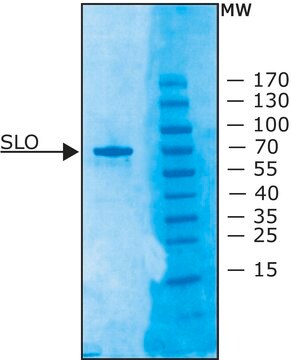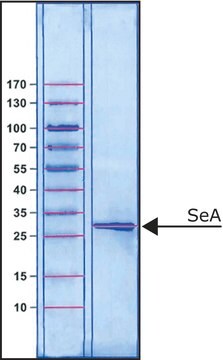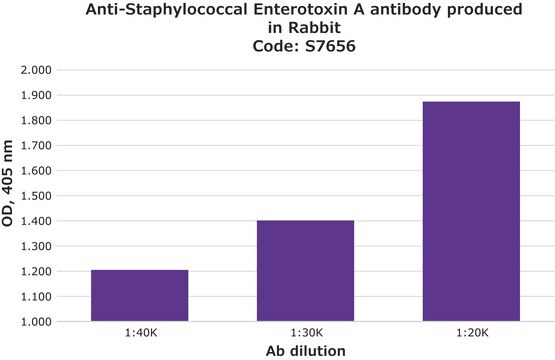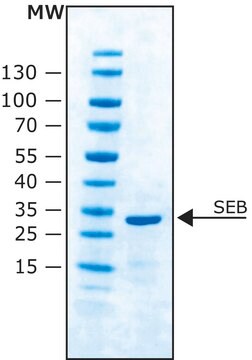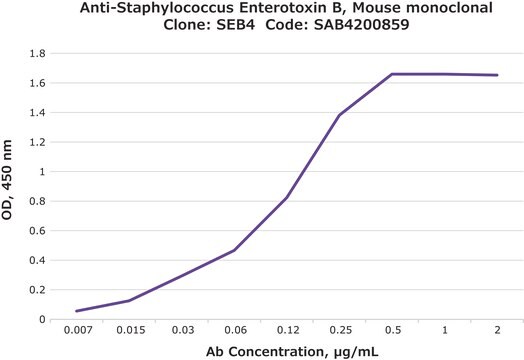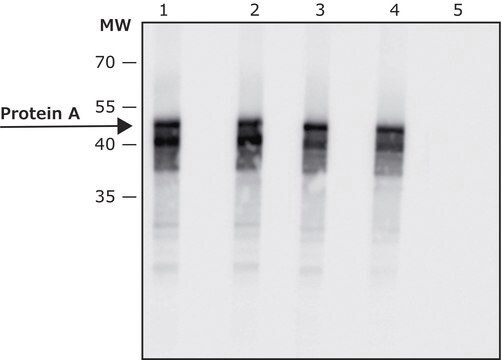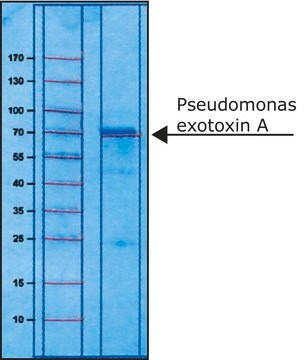S7531
Anti-Staphylococcal α-Toxin antibody produced in rabbit
whole antiserum
Sinonimo/i:
Anti-α-Hemolysin
Autenticatiper visualizzare i prezzi riservati alla tua organizzazione & contrattuali
About This Item
Prodotti consigliati
Origine biologica
rabbit
Livello qualitativo
Coniugato
unconjugated
Forma dell’anticorpo
whole antiserum
Tipo di anticorpo
primary antibodies
Clone
polyclonal
PM
antigen 33 kDa
contiene
15 mM sodium azide
Reattività contro le specie
Staphylococcus aureus
Confezionamento
antibody small pack of 25 μL
tecniche
dot blot: 1:20,000
indirect ELISA: 1:50,000
Condizioni di spedizione
dry ice
Temperatura di conservazione
−20°C
modifica post-traduzionali bersaglio
unmodified
Categorie correlate
Descrizione generale
Staphylococcal α toxin, a water soluble 33kD single polypeptide, is a cytotoxic agent secreted by Staphylococcus aureus. This protein has membrane damaging properties and accounts for erythrocyte lysis. Hence it is also referred to as lethal hemolytic toxin or α-hemolysin . Anti-staphylococcal α-toxin antibody can be used for studies of the toxin-membrane interaction. Rabbit anti-staphylococcal α-toxin antibody reacts specifically with staphylococcal α-toxin but not with staphylococcal enterotoxin A, cholera toxin or pseudomonas exotoxin A.
Immunogeno
α-toxin (α-hemolysin) from Staphylococcus aureus
Applicazioni
Anti-staphylococcal α-toxin antibody can be used in indirect ELISA (1:50,000) and dot blot immunoassay (1: 20,000).
Applications in which this antibody has been used successfully, and the associated peer-reviewed papers, are given below.
Enzyme-linked immunosorbent assay (1 paper)
Enzyme-linked immunosorbent assay (1 paper)
Qualità
The antiserum has been treated to remove lipoproteins.
Esclusione di responsabilità
Unless otherwise stated in our catalog or other company documentation accompanying the product(s), our products are intended for research use only and are not to be used for any other purpose, which includes but is not limited to, unauthorized commercial uses, in vitro diagnostic uses, ex vivo or in vivo therapeutic uses or any type of consumption or application to humans or animals.
Non trovi il prodotto giusto?
Prova il nostro Motore di ricerca dei prodotti.
Codice della classe di stoccaggio
10 - Combustible liquids
Classe di pericolosità dell'acqua (WGK)
nwg
Punto d’infiammabilità (°F)
Not applicable
Punto d’infiammabilità (°C)
Not applicable
Scegli una delle versioni più recenti:
Possiedi già questo prodotto?
I documenti relativi ai prodotti acquistati recentemente sono disponibili nell’Archivio dei documenti.
I clienti hanno visto anche
Alicia Lacoma et al.
Toxins, 13(2) (2021-02-11)
Staphylococcus aureus is a commensal and frequent colonizer of the upper respiratory tract. When mechanical ventilation disrupts natural defenses, S. aureus is frequently isolated from the lower airways, but distinguishing between colonization and infection is difficult. The objectives of this
Olivia A Todd et al.
mBio, 10(3) (2019-06-06)
Candida albicans and Staphylococcus aureus are among the most prevalent nosocomial pathogens that are responsible for severe morbidity and mortality, even with appropriate treatment. Using a murine model of polymicrobial intra-abdominal infection (IAI), we have previously shown that coinfection with
Shi-Jie Wan et al.
Frontiers in chemistry, 10, 877469-877469 (2022-04-19)
The emergence of antibiotic resistance in Staphylococcus aureus has necessitated the development of innovative anti-infective agents acting on novel targets. Alpha-hemolysin (Hla), a key virulence factor of S. aureus, is known to cause various cell damage and death. In this
Clarisse Leseigneur et al.
eLife, 11 (2022-06-21)
Nicotinamide adenine dinucleotide phosphate (NADPH) is the primary electron donor for reductive reactions that are essential for the biosynthesis of major cell components in all organisms. Nicotinamide adenine dinucleotide kinase (NADK) is the only enzyme that catalyzes the synthesis of
Ewa Olchowik-Grabarek et al.
Biochimica et biophysica acta. Biomembranes, 1864(10), 184011-184011 (2022-07-26)
Phenolic acids represent a class of drugs with mild antibacterial properties. We have synthesized iodinated gallic and ferulic acids and together with commercially available iodinated forms of salicylic acids studied their cytotoxicity, bacteriostatic and anti-virulence action. Out of these, iodogallic
Il team dei nostri ricercatori vanta grande esperienza in tutte le aree della ricerca quali Life Science, scienza dei materiali, sintesi chimica, cromatografia, discipline analitiche, ecc..
Contatta l'Assistenza Tecnica.
